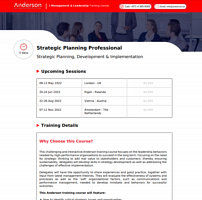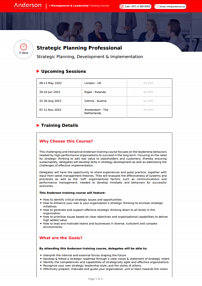- Course Finder
- Formats
- Training Topics
- Business Strategy
- Management & Leadership
- Personal Development Skills
- Innovation & Creativity
- Emotional Intelligence
- Governance and Compliance
- Business & Life Synergy
- Business Agility
- Business Sustainability
- Digital Transformation & Savviness
- Executive & Administrative Support
- Customer Service
- Sales & Marketing
- Human Resource HR Management
- Finance & Budgeting
- Data Science and Protection
- Project Management
- CertNexus
- Special Courses
- 10 Day Seminars
- The Essential Skills
- The Advanced Skills
- The Mini MBA Series
- Bootcamps
- Training Venues
-
- Certificates
- Calendars
- About us
- الدورات العربية
Upcoming Sessions
| 07-11 Oct 2024 | Dubai - UAE | $6,250 |
| 27-31 Jan 2025 | Dubai - UAE | $6,250 |
| 12-16 May 2025 | Dubai - UAE | $6,250 |
| 06-10 Oct 2025 | Dubai - UAE | $6,250 |
Training Course Overview
Accounting serves as the backbone of business communication, often dubbed the "language of business." It's the conduit through which managers convey the financial and economic status of their firms to external stakeholders like shareholders and creditors. In today's business landscape, financial literacy is indispensable for all professionals.
Regardless of a company's size, industry, or geographical location, its narrative unfolds within its financial records and reports. Key metrics such as income, debt, revenue, expenses, employee compensation, and customer retention costs are all encapsulated in these documents.
Even non-financial managers reach a juncture where they must justify their actions financially and make decisions grounded in numerical data sourced from others. Without a grasp of financial fundamentals and the ability to pose pertinent questions, one's effectiveness is compromised.
This sought-after Anderson training course serves as a primer on finance and accounting language, equipping participants with a thorough understanding of the accounting systems and procedures prevalent in business enterprises.
Training Course Objectives
By attending this Anderson training course, delegates will be able to:
- Be aware of how financial markets can support efficient business operations
- Read and understand annual financial reports, and be aware of how they are prepared
- Understand how business accounting systems work
- Identify and appraise wealth-generating investments
- Apply a range of management accounting techniques to maintain or improve profitability
Designed For
This Anderson training course is suitable to a wide range of professionals but will greatly benefit:
- Financial and business advisors
- Business entrepreneurs
- Members of the operational management team
- Those who are starting their careers in finance and accounting
- Non-executive board members on the Audit Committee
Training Course Outline
Amongst a wide range of valuable topics, the following will be prioritised:
- How to identify, understand, and record transactions in the accounting system
- Applying economic principles and professional judgement
- Analysis and interpretation of the financial statements
- Cost-Volume-Profit and break-even analysis
- Preparing and using budgets to control all aspects of our business
- An overview of financial and money markets
- Choosing the best financing products for your business
- Foreign currency transactions and managing exchange rate risk
- Identifying investment opportunities that fit your corporate strategy
- Incorporating risk into the investment decision
- Anderson Certificate of Completion will be provided to delegates who attend and complete the course
- Anderson Professional Certification (APC)® Certificate will be provided to delegates who successfully completes and pass the APC assessment
Training Course Overview
Accounting serves as the backbone of business communication, often dubbed the "language of business." It's the conduit through which managers convey the financial and economic status of their firms to external stakeholders like shareholders and creditors. In today's business landscape, financial literacy is indispensable for all professionals.
Regardless of a company's size, industry, or geographical location, its narrative unfolds within its financial records and reports. Key metrics such as income, debt, revenue, expenses, employee compensation, and customer retention costs are all encapsulated in these documents.
Even non-financial managers reach a juncture where they must justify their actions financially and make decisions grounded in numerical data sourced from others. Without a grasp of financial fundamentals and the ability to pose pertinent questions, one's effectiveness is compromised.
This sought-after Anderson training course serves as a primer on finance and accounting language, equipping participants with a thorough understanding of the accounting systems and procedures prevalent in business enterprises.
Training Course Objectives
By attending this Anderson training course, delegates will be able to:
- Be aware of how financial markets can support efficient business operations
- Read and understand annual financial reports, and be aware of how they are prepared
- Understand how business accounting systems work
- Identify and appraise wealth-generating investments
- Apply a range of management accounting techniques to maintain or improve profitability
Designed For
This Anderson training course is suitable to a wide range of professionals but will greatly benefit:
- Financial and business advisors
- Business entrepreneurs
- Members of the operational management team
- Those who are starting their careers in finance and accounting
- Non-executive board members on the Audit Committee
Training Course Outline
Amongst a wide range of valuable topics, the following will be prioritised:
- How to identify, understand, and record transactions in the accounting system
- Applying economic principles and professional judgement
- Analysis and interpretation of the financial statements
- Cost-Volume-Profit and break-even analysis
- Preparing and using budgets to control all aspects of our business
- An overview of financial and money markets
- Choosing the best financing products for your business
- Foreign currency transactions and managing exchange rate risk
- Identifying investment opportunities that fit your corporate strategy
- Incorporating risk into the investment decision
The Certificate
- Anderson Certificate of Completion will be provided to delegates who attend and complete the course
- Anderson Professional Certification (APC)® Certificate will be provided to delegates who successfully completes and pass the APC assessment
Info & In-house Solution
For more information about this course, call or email us at:
Call us: +971 4 365 8363





